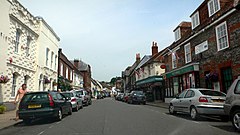Bishops Waltham
| Bishop's Waltham | |
|---|---|
 Bishop's Waltham High Street |
|
| Bishop's Waltham shown within Hampshire | |
| Population | 6,723 (2011 Census) |
| OS grid reference | SU554174 |
| District | |
| Shire county | |
| Region | |
| Country | England |
| Sovereign state | United Kingdom |
| Post town | Winchester |
| Postcode district | SO32 |
| Dialling code | 01489 |
| Police | Hampshire |
| Fire | Hampshire |
| Ambulance | South Central |
| EU Parliament | South East England |
| UK Parliament | |
Bishop's Waltham is a small town in Hampshire, England situated in the Hamble Valley at the head of the River Hamble. It is home to the ruins of Bishop's Waltham Palace, an English Heritage monument.
The town's name comprises three parts 'walt' – forest; 'ham' – settlement'; and 'Bishop's'. It started off as an Anglo-Saxon village, and steadily grew to become one of Hampshire's largest villages, despite being burnt to the ground by Danes in 1001 AD. By the time of the Domesday book (1086 AD), it had a population of around 450. In 904, it was given by the king to the Bishop of Winchester. In 1136 Henry de Blois, a later bishop, built the now-ruined Bishop's Waltham Palace. It was destroyed on the orders of Oliver Cromwell during the English Civil War. Much of the old Palace is still in the town. Apart from the ruins, which are open to the public, material from the Palace was used as building materials in town buildings still standing to this day.
William of Wykeham died in the town, while after the Battle of Trafalgar, some French sailors including Admiral Villeneuve were imprisoned there.
There are many Georgian buildings in the town alongside the Norman parish church. The town retains a unique character, with a number of small local businesses (such as a butchers, bakery and fishmonger) including an off-licence which was established in 1617 (Bakers Wine Merchants). The famous High Street in the town is also home to a number of chain stores (such as Co-op) and a small supermarket chain (Budgens), however, the owners of these and other stores have fought to prevent larger chains from threatening their businesses and, they argue, the character of the town. Unusually for the United Kingdom, there is a vineyard nearby.
...
Wikipedia

